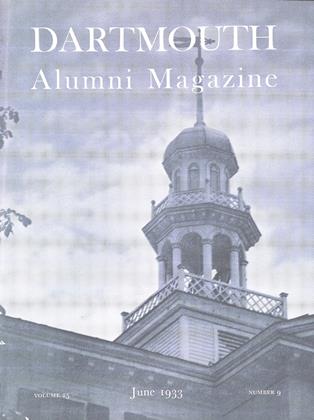AMONG THE memorable commencements of Dartmouth College such as those of 1771 the First Commencement, of 1776 when the Revolution's guns had already been heard in Hanover, of 1861 when Turmoil had again raised its head, of 1917 when another Crisis was at hand, it is possible that the Commencement of 1933 may take its place in college and university history as the Depression Commencement. And whatever changes may have come upon the country and upon the College when men who were here in 1933 look back and think over the events of that spring it is quite certain that there will be remembered the exchanges of opinion and sentiment upon that occasion. For it is quite possible that upon the date of this Commencement the alumni of the College will be drawn closer together by the sense of the misfortune which has come upon all people of the country alike.
If one might imagine that one was looking back, say from 1950 upon the Commencement of 1933, it is probable that those who were in Hanover will remember the more than friendly companionship and the markedly sincere sympathies that existed among the men of the reuning classes that ventured back. Whatever of affection and loyalty had existed for and among class groups in earlier days was in this year strengthened and made more real. The man who had not done so well in a financial way as many of his mates and had previously disliked to appear as being less successful than they found that a general levelling had removed most of the old social differences, imaginary though they might have been, and more of the democracy which had existed in his own undergraduate days united the group into a closer fellowship. And there were men who came back to that reunion who had never before returned to reunions, and a great deal of earlier differences and divergences of careers and ambitions had vanished, and in the calm and peaceful environment of the College many of the rushing and distressing elements of an embattled life were dispelled.
These are not sentimental days. A world which thought itself sophisticated drove out of common practice the expression of endearing terms for schools and colleges and universities. It is perhaps better that one should feel sincere emotions rather than to put those expressions in words. It has a smack of "giving way." And yet when one wanders out across the campus at night, alone, and thinks of days when hearts beat a little faster and ambitions were perhaps higher and possibly more idealistic, there is certainly a refreshing quality in such meditation and a realization that one rather noble ideal is shared by some thousands of men. It was believed at least by the man who came back in 1950 and thought of 1933.
 View Full Issue
View Full Issue
More From This Issue
-
 Sports
SportsFOLLOWING THE BIG GREEN TEAMS
June 1933 -
 Article
ArticleHANOVER BROWSING
June 1933 By Rees Higgs Bowen -
 Class Notes
Class NotesClass of 1930
June 1933 By Albert I. Dickerson -
 Article
ArticlePIONEERING IN TELEGRAPHY
June 1933 By William U. Swan -
 Class Notes
Class NotesClass of IQ9 1
June 1933 By Jack R. Warwick -
 Article
ArticleSecretaries Convene
June 1933
Lettter from the Editor
-
 Lettter from the Editor
Lettter from the Editor'Round the Girdled Earth
April 1943 -
 Lettter from the Editor
Lettter from the Editor'Round the Girdled Earth
January 1944 -
 Lettter from the Editor
Lettter from the EditorPress
October 1947 -
 Lettter from the Editor
Lettter from the EditorPassages
JANUARY/FEBRUARY 1984 By Douglas Greenwood -
 Lettter from the Editor
Lettter from the Editor"Only Connect..."
MAY 1986 By Douglas Greenwood -
 Lettter from the Editor
Lettter from the EditorYou could say a woman started it all.
MARCH 1997 By Karen Endicott


